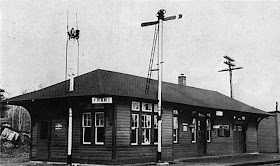 |
| Chapleau CPR Depot 1900 CP Corporate Archives |
By Ian Macdonald
Buildings are an important part of Chapleau’s cultural heritage including the original CPR depot opened in 1886 that was described in a previous article and presently located on Monk Street. In most instances, historically important buildings like this can be given a second or third life through adaptive-use or adaptive re-use. Adaptive re-use is an approach where the original major elements ( window types, door types, finishes etc.) of the original building are maintained but modifications are made to accommodate a completely different occupancy than the original.
Below is Stirling Rotary Club facility. Stirling Rotary Club
One example of imaginative adaptive re-use is the Rotary Club facility in Stirling Ontario ( population 2139 ). This building was originally one of the first T-1 type railway depots in Canada very similar to the first CPR depot built in Chapleau. A new foundation was built for the old Stirling Grand Trunk depot on a more central site in the community and the building was literally picked up and relocated there. A barrier free ramp was constructed to meet present day building code requirements .
The restored Stirling facility includes a tourist information centre and an antiques and collectibles shop. Downstairs is the Rotary Hall, where the Stirling Rotary Club meets every week. The hall is rented out for parties, business events and meetings. This was part of the business plan that was developed to make the facility economically sustainable.
Below is Dubreuiville restoration construction R.I.Macdonald collection
Another example of adaptive re-use closer to home was carried out by an ambitious group in the small town of Dubreuiville, Ontario ( population 635 ).
Below is Franz station 1940
The former CPR/ ACR depot at Franz was acquired and moved approximately twelve miles from Franz to Dubreuiville where it was placed on a new foundation, restored and is now a fully functional tourist information/ souvenir shop.
Below is completed Dubreuville project
The Hudson’s Bay Company played an important role in the early days of Chapleau. The Chapleau post was, for a brief time, the headquarters of the Michipicoten district of the HBC. However, the first building constructed by the HBC was in 1884 as CPR construction was approaching what is now Chapleau. It was a small log sub-post (post with two outbuildings) on the Nebskwashi River approximately a mile south of the community on what is now IR 61 of the Chapleau Ojibwe First Nation.
HBC Chapleau store HBC Archives
The next buildings, which were built in 1886, were a retail store on the southwest corner of Birch and Young Streets (site of the old Algoma Hotel) and a residence for their post manager at the west end of Pine Street. The log sub post south of town was abandoned in 1889 and the retail store apparently burned in 1895. The residence was sold by the HBC shortly thereafter and still exists to the present day.
Below is HBC Post Manager’s house 1886 HBC Archives
The style of the HBC house isn’t particularly unique and is similar to the majority of the first homes built in Chapleau in the late nineteenth century. It is, however, significant because of its relationship to the Hudson’s Bay Company era and was one of the first houses built in Chapleau in the early days of 1885 and 1886. The location of this house adjacent to one of Chapleau’s main intersections obviously provides the potential for restoration as a tourist information centre or other similar function.
Below is HBC house 2015 Michael McMullen
Many Important Chapleau buildings have been demolished but those remaining include St.John’s Anglican Church completed in 1908, the Legion Hall opened in 1920 and the Post Office building completed in 1950. Each of these buildings has historical significance.
There is no established formula as to how to breathe life into an older building but one has to accept that the task is never easy. Church restorations in particular are complicated. St.John’s Church, for instance, obviously has to be saved despite not having a large enough congregation to support it.
In this case, sentimental association with former times and traditions has to be abandoned to ensure that a wide range of development possibilities is revealed regardless of the discomfort that this might first create. A good measure of thinking “outside the box” will be required to sustain the social usefulness of this building for future generations. The good news is that many churches in Canada have had to deal with the same challenge and developed a wide variety of innovative, practical and successful solutions.
One can only hope that the people on Council, CDEC and other positions of influence in the community recognize that older buildings can offer opportunities a for a community’s future.
LINK TO FIRST COLUMN http://michaeljmorrisreports.blogspot.ca/2015/09/cultural-heritage-important-to-chapleau.html

















